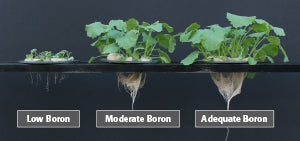सब्जी वर्गीय फसलों में बोरोन का महत्व (Importance of boron in vegetable crops)
Boron (B) is a micronutrient required in very small amounts and there is a narrow range of safety when applying boron as toxicities can occur if too much is applied.
Vegetables vary considerably in their B requirements.
High B requirement crops include broccoli, cabbage, cauliflower, beets, spinach, turnips, and rutabaga. Apply 1.5kg/a of B for these crops.
Medium B requirement crops include asparagus, carrots, cucumbers, eggplants, leeks, muskmelons, okra, onions, parsnips, radishes, squash, strawberries, sweet corn, tomatoes, and potatoes. Apply 1kg/a of B for these crops.
Low B requirement crops include peppers and sweet potatoes. Apply 500g/a of B for these crops.
Very low B requirement crops include beans and peas. No additional boron is usually needed for these crops (snap beans actually are very sensitive to high B levels which will cause toxicities).
Boron deficiency symptoms in plants include the death of growing points resulting in a stunted or rosette appearance; leaves with a yellowish or reddish cast, and in members of the cabbage family most boron deficient cole crops develop cracked and corky stems, petioles and midribs. The stems of broccoli, cabbage and cauliflower can be hollow and are sometimes discolored. Cauliflower curds become brown and leaves may roll and curl, while cabbage heads may be small and yellow. Of all the cole crops, cauliflower is the most sensitive to boron deficiencies.
It is recommended in broccoli and kale to apply 1.5kg of boron (B) per acre in mixed fertilizer prior to planting. In Brussels sprouts, cabbage, collards and cauliflower, boron and molybdenum are recommended. Apply 1.5kg of boron (B) per acre and 100g molybdenum (Mo) applied as 250g pound sodium molybdate per acre with broadcast fertilizer.
Boron may also be applied as a foliar treatment to cole crops if soil applications were not made. The recommended rate is 0.2-0.3 100-200g/acre of actual boron (500g to 1.5kg of Solubor 20.5%) in sufficient water (30 or more gallons) for coverage. Apply foliar boron prior to heading of cole crops.
Boron toxicity is common in western states where boron levels in soils or irrigation water are high. In the east, we do not have high boron soils or high levels in irrigation water. In addition, boron leaches readily from soils. Boron toxicities therefore occur only when excess boron is applied in fertilizers. The margin of safety for boron application is small and excess application or improper blending in fertilizers may lead to toxicities – deficiencies show up at 1 ppm and toxicities appear at 5 ppm of available boron in the soil (leaf tissue levels between 20 and 100 ppm are sufficient with tissue levels over 200 ppm being excessive leading to toxicities).
The vegetable crops most sensitive to excess boron are beans, particularly snap beans. Boron is generally not recommended for snap bean production and boron should never be included in starter fertilizer for snap beans. Boron toxicity often occurs where starter fertilizer containing boron for other crops, such as corn, is applied to snap beans.
Boron toxicity in beans commonly appears as yellowing in unifoliate leaves with burning of leaf edges and yellowing of leaf edges of the older trifoliate leaves that can progress to edge burn. In severe cases, plants will develop a scorched appearance and leaves may prematurely drop off.


Comments
Leave a comment